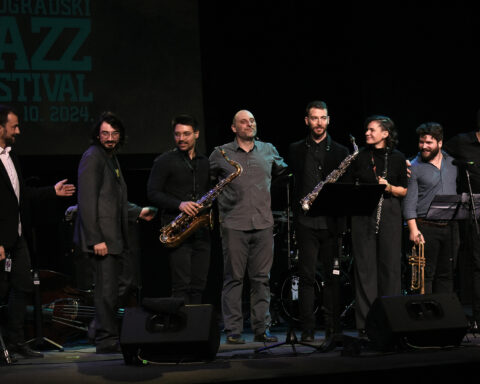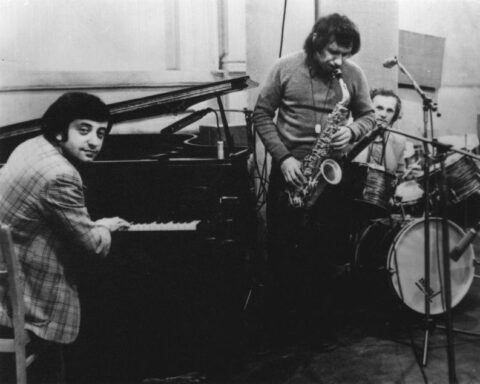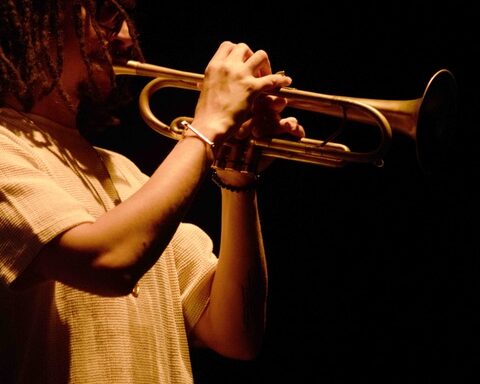The 16th annual Jazz Journalists Association Jazz Awards celebrates the world-wide nature of the jazz network, as the JJA co-hosts parties in 14 cities from Auckland, New Zealand to Tucson, Arizona from June 18 through 28, 2012. That includes the New York City gala cocktail party at the Blue Note
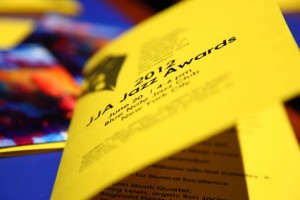
Jazz Club, where winners were announced in 40 categories of Jazz Awards for excellence in music and music coverage on June 20.
Sonny Rollins won the Jazz Awards for Musician of the Year, Record of the Year (Road Shows, Vol. 2) and Tenor Saxophonist of the Year — Horace Silver, age 84 and ailing, was celebrated with a Lifetime Achievement in Jazz Award, poet-playright-social critic Amiri Baraka won for Lifetime Achievement in Jazz Journalism, and author Albert Murray was given a special “Words and Music Award,” co-presented by the Jazz Foundation of America and the JJA.
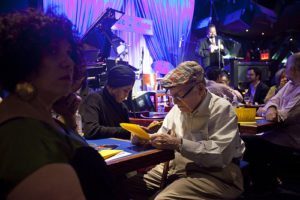
Jazz celebrities flocked to the Blue Note — Awards winners and nominees in attendance included Joe Lovano, Ben Williams, Maria Schneider, Vijay Iyer, Rudresh Mahanthappa, Anat Cohen, Wycliff Gordon, Gary Smulyan, James Carter, Ron Carter, Matt Wilson, Karrin Allyson, Wadada Leo Smith, Randall Kline, Ben Allison, Giacomo Gates, Gregory Porter, Ted Nash, Claire Daly, Lew Tabackin, Jamie Baum, Jason Moran, Adam Rudolph and Sammy Figueroa. Recording industry figures Steve Berkowitz, Tina Pelikan, Francois Zalacain, Yulun Wang and Seth Rothstein, representatives from sponsors BMI, Reviver Music, WBGO, the New York City Jazz Record, Newport Jazz Festival producer George Wein and Absolutely Live presenter/manager Danny Melnick, were present. Among the many journalists were JazzTimes editor Evan Haga (JazzTimes won “Best Print Periodical” every year since the category was established in 1999), Mario Tahi Lathan (director of the winning Short Form Jazz News Video, “Victory! — The Making of J.D. Allen’s Album”), Larry Blumenfeld, Will Friedwald, Willard Jenkins, Nate Chinen, Linda Yohn, Fran Kaufman, Laurence Donohue-Greene, Patrick Jarenwattananon, Lois Gilbert, Bill Milkowski, Lena Adasheva, Ray Foley and Huffington Post videoblogger Michal Shapiro, plus many more JJA members and unaffiliated colleagues were there. Some were not: There was no representative, for instance, of AllAboutJazz.com, which won its 10th consecutive award as Best Website of the Year. But see Fran Kaufman’s slide show of the event, and the gallery put up by Lois Gilbert of JazzCorner.com.
But of equal significance to well-known musicians and renown journalists being honored has been the recognition by jazz journalists and devotees in local scenes of local Jazz Heroes — people who’ve sustained the music through example, by educating and entertaining each other and their audiences in the decentralized locales that, tied together, comprise a richly diverse universe. These Jazz Heroes are being honored at Awards “satellite parties” being held between June 18 and 28 in 13 locales.
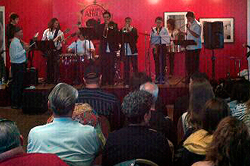
In Ottawa, festival organizer Jacques Emond was hailed for his work throughout the arts with jazz as his touchstone; in Auckland New Zealand it was saxophonist Roger Manins, who besides playing teaches and directs a non-profit arts organization. In Atlanta, Philadelphia, Tallahassee and Tucson the Heroes — respectively, Danny Harper, Sam Reed, Leon Anderson Jr. and Lamont Arthur — are session leaders who also mentor and teach. In Detroit and Los Angeles, club owners Bert Dearing and Catalina Popesco; in Schenectady radio show host Bill McCann, in Chicago trumpeter, University professor/grade school activist and organizer of the Chicago Jazz Philharmonic Orbert Davis, in San Francisco mainstay of Latin jazz Dr. John Calloway, and in Gainesville anchoring educator R. Gary Langford have been or will be within coming days the toast of their communities, given greater profile through JJA efforts.
The JJA’s point in its initiative is to emphasize that jazz happens everywhere, daily, and is not only the province of its biggest stars. Furthermore, jazz fans and professionals exist beyond the Big Apple, and to recognize the decentralization of jazz — which goes back to its beginnings, when territory bands flourished simultaneously with jazz’s emergence as a powerful new art coming out of New Orleans, reaching Chicago, Los Angeles and New York City — is to be convinced that if the most celebrated commercial entities of jazz are shaken by developments of the digital revolution, the music is so deeply and widely rooted as to be indestructible, though too often its tenacity and nurturing qualities are overlooked.

Global thinking and local action has long been the hallmark of jazz. The sounds of Louis Armstrong were hailed and emulated as soon as 78 rpm records were distributed across the Atlantic and Pacific oceans. Jazz captured the attentions and affections of players and listeners alike in Africa, Asia, Central and South America as well as the U.S., Canada, the UK, Western and Eastern Europe — and whereas Americans first toured the world to introduce the sounds live, today emissaries of jazz from distant shores are frequent visitors to and often favorite artists of jazz hubs throughout the U.S.
The cross-fertilization of music and its accompanying ideas/ideals is one of the true benefits of globalization, a phenomenon in which jazz was an early predictor. For the JJA to celebrate jazz far and wide is not an odd whim, but a renewal of the conviction that jazz arises wherever people engage in creative, expressive play. That means everywhere. It’s good for the JJA to remind everyone within media reach that improvisation, call and response, spontaneous interactivity, thematic variation, rhythmic propulsion, meritocracy and the joys of music are far from exclusively the province of the few at the peak of the profession, but instead attributes that we all — amateurs and seasoned pros alike can embrace and employ. Jazz arises naturally out of humanity. The JJA is proud to use all media, such as our recent International Jazz Blogathon, to again assert that jazz has something to offer of benefit to everyone who becomes aware of it.



